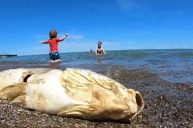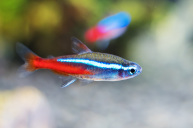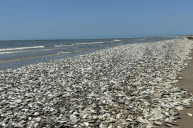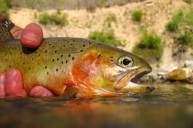You probably don't want to swim and fish in this California lake. Thousands of dead fish recently washed to shore in a scene that can only be described as sad and alarming.
After the massive fish die-off, California officials closed the lake to visitors. Officials first became aware of the issue during the 4th of July weekend. However, they're still not sure what is killing the fish at Lake San Antonio. Since they haven't determined the cause, they chose to close the lake out of an abundance of caution.
As far as the fish go, it appears something has killed several species of fish. Bass, three to four pounds, appeared among the mass of dead fish. The mass die-off then washed to shore in a scene that looks very much like a fish apocalypse.
Lake San Antonio to Close due to Fish Die Off.
The fish die off we alerted you to last Friday has gotten worse, and the lake is being closed while testing and clean up is being done. We'll keep you posted about testing and when the lake can reopen. pic.twitter.com/ImimqZNbCB— MontereyCoInfo (@MontereyCoInfo) July 10, 2024
Thousands Of Fish Die
"While this may be a natural occurrence, until it is known that this is not being caused from a biological vector or pollutant that could cause harm to the public, we must keep the public safe by closing the park," the county's Chief of Parks Bryan Flores wrote in the statement. Flores said that he has never seen such a mass die-off of fish at this scale during his entire time working.
"It seems like every fish species in the lake is being impacted," Flores told SFGATE.
It wouldn't be the first California lake where this has happened. In early July, more than a 1,000 pounds of fish died at Lake Elizabeth. That man-made body of water houses catfish, trout, crappie, and carp. Around 90% of the fish that died was carp with no new die-offs since July 9. In that case, officials blamed the hea way. They believe the heat diminished the oxygen levels in the water.
"The fact that we are not getting the afternoon and evening cooldowns we historically experience here in Fremont is exacerbating the problem and not allowing the water temperature to drop and partially improve overnight," city officials wrote. Meanwhile, officials initially suspected there may be something similar at work with Lake San Antonio.
However, tests showed normal oxygen levels. "We're starting to see these fish that shouldn't really be impacted by the heat ... that's when we said, wait a minute, something else might be going on," Flores said. Right now, they're waiting to see if tests confirm some sort of chemical or toxic algae in the water. The lake will remain close until then.




